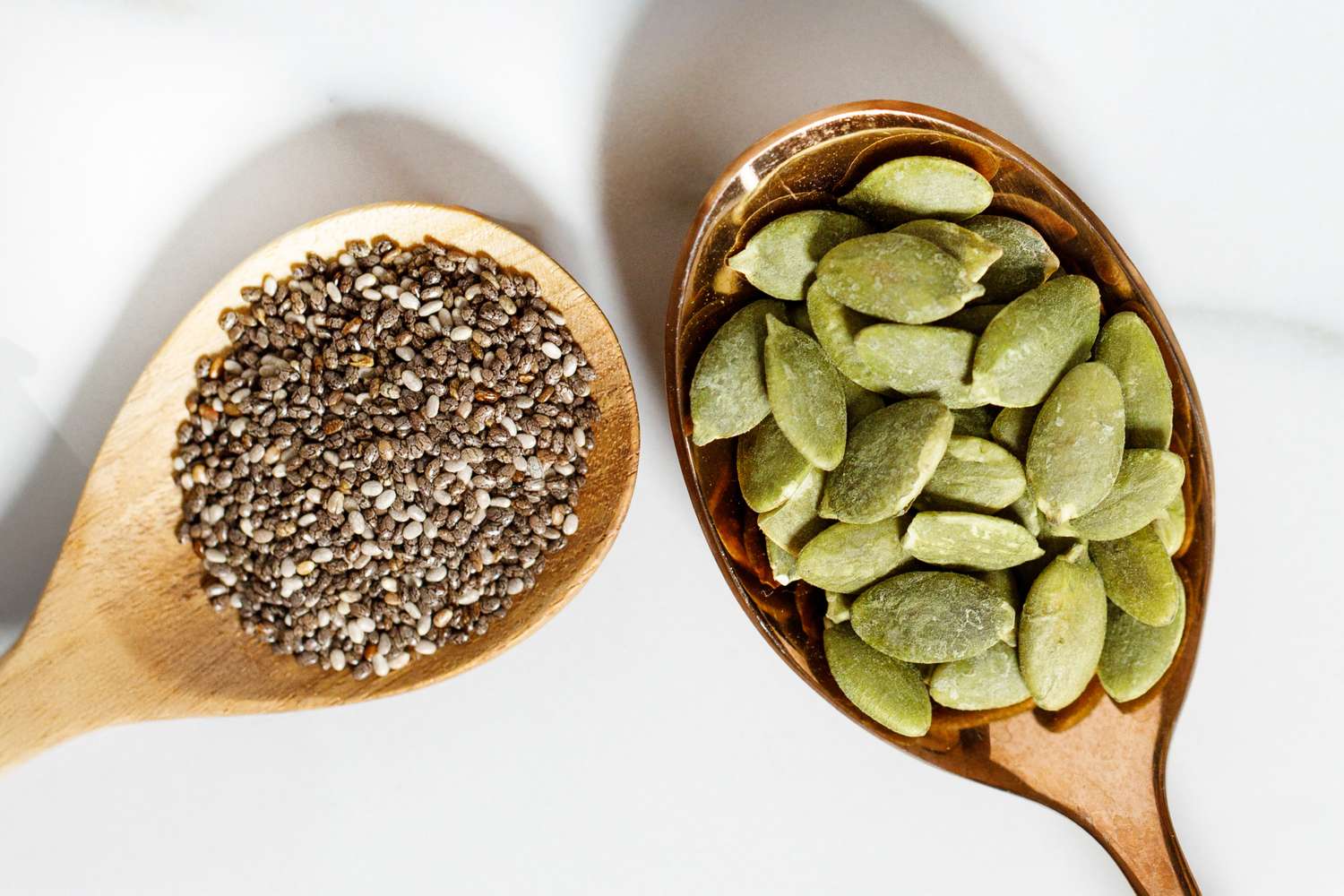Key Points
Both pumpkin and chia seeds are nutrient-rich superfoods that support heart, bone, and digestive health in different ways.Pumpkin seeds offer more protein, zinc, and heart-healthy fats, while chia seeds excel in fiber, calcium, and omega-3 content.Both seeds are versatile—pumpkin seeds add crunch to meals or make a rich butter, while chia seeds thicken smoothies, puddings, and jams.
They may be small, but when it comes to enriching your daily diet, seeds are no slouches. Two of our favorite go-tos, pumpkin seeds and chia seeds, are tiny titans, supporting the body in numerous ways. We asked nutrition experts to explain the benefits of each, and the best ways to enjoy their superpowers.
Pumpkin Seeds vs. Chia Seeds: Which One Is Healthier?
The answer depends on what you’re looking for from your seeds—and how you plan to use them. “Both are nutrient-dense and complement each other well. They can easily fit into a plant-based eating pattern,” says Melissa Mroz-Planells, DCN, RDN, and spokesperson for the Academy of Nutrition and Dietetics.
“Unless someone has specific health goals that we are tailoring nutrient intake for, I typically recommend just cycling through various nuts, seeds, and legumes so you benefit from as many different nutrients as possible,” says Desiree Nielsen, RD, host of The Allsorts podcast, and cookbook author.
For boosting your fiber intake, chia seeds stand out. Mroz-Planells says. If getting more calcium for bone health is a priority, Nielsen recommends eating more chia seeds. “If you want more protein and healthy fats, for satiety, pumpkin seeds may be a better fit,” Mroz-Planells says.
Benefits of Pumpkin Seeds
A superfood, pumpkin seeds are available with hulls, shelled (known as pepitas), or scooped straight from fresh pumpkins, and offer a host of health benefits.
Heart-Healthy Fats
Pumpkin seeds contain unsaturated fatty acids, like the plant-based omega-3, alpha-linolenic acid (ALA), and omega-6 fatty acids, plus monounsaturated fats. Their healthy fats help lower LDL (bad cholesterol), raise HDL (good cholesterol), and regulate blood pressure.
Protein and Minerals
Chia and pumpkin seeds are considered complete proteins and contain all nine essential amino acids, though pumpkin seeds are higher in protein and zinc. “Both are excellent sources of magnesium, phosphorus, and iron, supporting energy metabolism and muscle function,” Mroz-Planells says. “Magnesium is important for nervous system function, including muscle relaxation, which is why it’s such a heart-healthy mineral,” Nielsen explains, adding that zinc is critical for immune function and skin health.
Nielsen regards pumpkin seeds as an energizing food due to their rich mineral content, including iron, manganese, and selenium. Pumpkin seeds provide sustained energy and double as a stress reliever. This plant food is a source of the amino acid tryptophan; combined with magnesium, zinc, copper, and selenium, it enhances a good night’s sleep.
Anti-Inflammatory Properties
Pumpkin seeds contain antioxidants like vitamin E and flavonoids, which complement omega-3s, helping to reduce inflammation in the body. Pumpkin seeds with hulls have an edge fiber-wise, containing about 5.2 grams of fiber per ounce compared to pepitas with 1.8 grams of fiber, which further increases those anti-inflammatory effects.
“Keep portions in check since both are calorie-rich,” Mroz-Planells says. A one-ounce serving of pumpkin seeds has about 125 calories; a one-ounce serving of chia seeds has around 138 calories.
How to Enjoy Pumpkin Seeds
The unique textures and flavors of pumpkin and chia seeds naturally lend themselves to different uses, Nielsen explains.
Try grinding the seeds into little nutrient “sprinkles” to top your morning cereal, she suggests.
Add them to granola bars and muffins, or scatter them over soups, salads, yogurt, oatmeal, grain bowls, hummus, and guacamole. “If you’re looking for a delicious sauce to boost your meals, a pumpkin seed salsa macha is a staple,” Nielsen says.
Toss roasted or lightly toasted pumpkin with tamari or hot sauce for a crunchy snack.
Pumpkin seeds make a rich, nutritious butter. “Pop them into a food processor (you can toast them first for extra flavor and to speed up blending) and let them go until a butter forms,” Nielsen says.
Benefits of Chia Seeds
As with pumpkin seeds, chia seeds offer a concentrated source of key nutrients in a small package, Mroz-Planells says. They can expand up to 12 times their size in liquid.
Protein and Minerals
Chia seeds are loaded with essential minerals, including phosphorus, selenium, and manganese, key for metabolism and antioxidant support. Their calcium and magnesium content help support bone and nervous system health, Nielsen notes, while zinc and iron are important for sustaining energy and immunity.
Gut Health
“Chia seeds offer both soluble (that’s why they gel) and insoluble fiber to help improve gut health,” Nielsen says.
Healthy Fats
This superfood is also a unique source of omega-3 fatty acids. “Just one tablespoon contains all the omega-3 ALA you need in a day!” Nielsen says. Still, there’s a caveat, she says: “The bulk of the nutrition in a chia seed is contained in the inner core, so if you want to absorb more nutrition from your chia seeds, be sure to consume them ground.”
How to Enjoy Chia Seeds
A natural thickening agent, chia seeds magically transform everything from yogurt to oats.
Chia seeds can replace eggs in baked goods. “I stir one tablespoon of ground chia with two tablespoons of warm water and let that sit before using,” Nielsen says.
Chia seeds are perfect for a creamy texture and fiber boost, Mroz-Planells says. For smoothies, add an extra 1/4 cup of liquid to accommodate the thickening action, Nielsen advises.
One or two tablespoons of seeds per serving increases the omega-3s and minerals in overnight oats, she adds.
Layer chia pudding with fresh fruit and nuts.
Chia seeds can make a quick, fresh fruit jam for breakfast.

